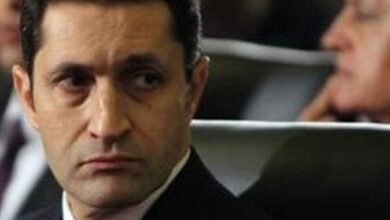Most of Tuesday’s newspapers lead with the revelation made yesterday by the head of the Illicit Gains Authority about the assets held by Mubarak’s family in Europe. In a red font, the state-owned Al-Akhbar daily leads with a sarcastic headline: “The most flourishing era of looting,” in reference to the Mubarak era.
Judge Assem al-Gohary, assistant justice minister for illicit gains affairs, announced yesterday that Alaa and Gamal Mubarak hold US$340 million in Swiss banks, according to Al-Ahram. Gohary added that the Swiss government suspects that Mubarak’s son Alaa, former Tourism Minister Zoheir Garana, and Egyptian businessman Hussein Salem were involved in money laundering, the story continues. In the meantime, Gohary is quoted in Al-Akhbar as saying that Hussein Salem, natural gas tycoon and Mubarak’s close friend, along with his two children, possess LE24 billion in foreign banks. It is still to be seen whether the Egyptian government will be able to retrieve these assets.
On its front page, Al-Wafd newspaper, the mouthpiece of the liberal Wafd Party, highlights the story of Ahmed Atef, the doctor who was allegedly kidnapped last week. Atef had played a leading role in mobilizing a general doctors’ strike earlier this year. The paper quotes Atef as saying that he was coming out of the hospital where he works in Shubra when a man asked him to rescue the man's daughter. This stranger then escorted Atef to a car, claiming that his daughter was lying in there. As soon as Atef reached the car, he found a number of people inside, including thugs, one of whom was carrying a gun. He was told that they would take him away for an hour to interrogate him. However, he spent more than one hour in their custody. The following day, Atef was interrogated about the doctors’ strike and the election for the Doctors Syndicate, reports Al-Wafd. On Monday, Atef was reportedly given a sleeping pill and later found himself lying in the Moqattam desert. This incident proves that Egypt’s transitional government is reproducing the same oppressive tactics of Mubarak’s regime, which used to kidnap activists and political opponents.
Atef's kidnapping came a few days before the Doctors Syndicate election, which witnessed a symbolic victory for non-Islamists. Although Muslim Brotherhood-supported doctors ended up with the majority of seats in the syndicate's board, nascent non-Islamist groups succeeded in ending the long dominance of Islamists in syndicate branches in several provinces.
In her column in privately-owned Al-Tahrir, Naglaa Bedeir celebrates the victory of Mona Mina, a left-wing doctor who made it onto the syndicate board. “Getting a seat on the syndicate’s board is not an easy thing to do, especially for Mona Mina, who is not an expert on elections and can never make alliances or wear several hats … Mona Mina has completely different skills,” writes Bedeir. Bedeir goes on to review the role played by Mina in the last four years to unite doctors over a host of demands, including improving working conditions, raising salaries and receiving appropriate training. During the revolution, Mina camped in the ad hoc hospital in Tahrir Square to help the wounded, adds Bedeir.
“The success of Mona Mina proves that the good can win in real life and not only in old Arab movies,” Bedeir concludes.
Al-Tahrir's front page leads with news about a meeting held between Brotherhood Supreme Guide Mohamed Badie and more than 150 young Copts. The paper says this meeting came in light of the Brotherhood’s attempts to reach out to Christians. Coptic youths asked Badie 30 questions about his group’s interpretation of Islamic Sharia, how they will treat non-Muslims if they come to power and whether they will enforce Islamic hudud or capital punishment, reports Al-Tahrir. Badie stressed that Muslims and Copts are partners in Egypt. He said he preferred to answer some questions in writing and would send his answers back to his interviewers later, adds the paper.
As usual, privately owned Al-Shorouk's lifestyle page runs a robust feature on the link between squares and protests. In a full page, the paper explores why different political groups have chosen different squares to voice their grievances during and after the 25 January revolution. The author interviewed pro-Mubarak supporters to understand why they chose Mostafa Mahmoud Square in Mohandiseen, as well as Copts to decipher why they staged all their protests at Maspero. Ramy Kamel, a Christian activist, is quoted as saying that Copts decided to hold their first protest at Maspero right in front of the state television building to object to media coverage that they felt had downplayed Coptic grievances.
Aside from activists, the author interviewed Soheir Hawas, an expert on architecture and urban planning, who said that the square chosen determines the strength of a protest. She said that Maspero is not a good location because it is not rounded, hence protesters have to stand in lines along the edge of the Nile. Mostafa Mahmoud Square has similar drawbacks, as it does not have a pivotal point that people can rally around, she continued, adding that the fountain that lies in the middle tends to disconnect protesters. Tahrir Square, however, is big enough and can accommodate large numbers of protesters, Hawas said. The tall buildings lining it served as protective walls for demonstrators during the revolution, Hawas added.
Egypt's papers:
Al-Ahram: Daily, state-run, largest distribution in Egypt
Al-Akhbar: Daily, state-run, second to Al-Ahram in institutional size
Al-Gomhurriya: Daily, state-run
Rose al-Youssef: Daily, state-run
Al-Dostour: Daily, privately owned
Al-Shorouk: Daily, privately owned
Al-Wafd: Daily, published by the liberal Wafd Party
Youm7: Daily, privately owned
Al-Tahrir: Daily, privately owned
Sawt al-Umma: Weekly, privately owned
Al-Arabi: Weekly, published by the Arab Nasserist party




